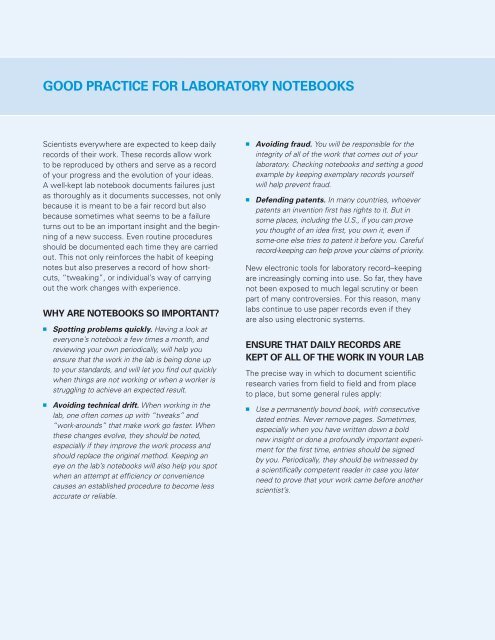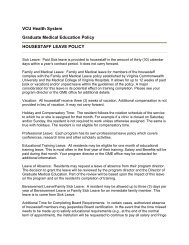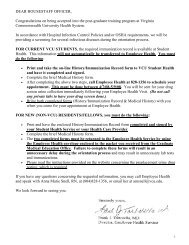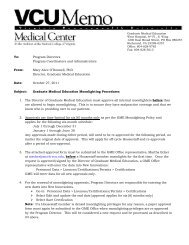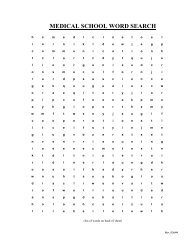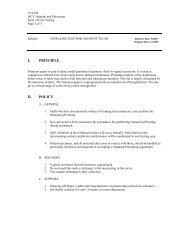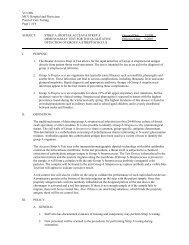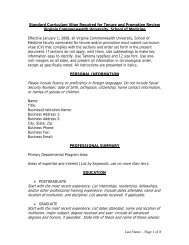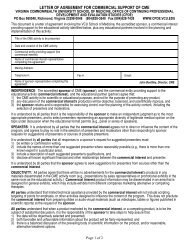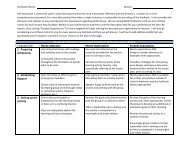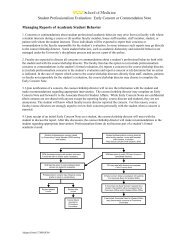good practice for laboratory notebooksScientists everywhere are expected to keep dailyrecords <strong>of</strong> their work. These records allow workto be reproduced by others and serve as a record<strong>of</strong> your progress and the evolution <strong>of</strong> your ideas.A well-kept lab notebook documents failures justas thoroughly as it documents successes, not onlybecause it is meant to be a fair record but alsobecause sometimes what seems to be a failureturns out to be an important insight and the beginning<strong>of</strong> a new success. Even routine proceduresshould be documented each time they are carriedout. This not only reinforces the habit <strong>of</strong> keepingnotes but also preserves a record <strong>of</strong> how shortcuts,“tweaking”, or individual’s way <strong>of</strong> carryingout the work changes with experience.Why are notebooks so important?n Spotting problems quickly. Having a look ateveryone’s notebook a few times a month, andreviewing your own periodically, will help youensure that the work in the lab is being done upto your standards, and will let you find out quicklywhen things are not working or when a worker isstruggling to achieve an expected result.n Avoiding technical drift. When working in thelab, one <strong>of</strong>ten comes up with “tweaks” and“work-arounds” that make work go faster. Whenthese changes evolve, they should be noted,especially if they improve the work process andshould replace the original method. Keeping aneye on the lab’s notebooks will also help you spotwhen an attempt at efficiency or conveniencecauses an established procedure to become lessaccurate or reliable.n Avoiding fraud. You will be responsible for theintegrity <strong>of</strong> all <strong>of</strong> the work that comes out <strong>of</strong> yourlaboratory. Checking notebooks and setting a goodexample by keeping exemplary records yourselfwill help prevent fraud.n Defending patents. In many countries, whoeverpatents an invention first has rights to it. But insome places, including the U.S., if you can proveyou thought <strong>of</strong> an idea first, you own it, even ifsome-one else tries to patent it before you. Carefulrecord-keeping can help prove your claims <strong>of</strong> priority.New electronic tools for laboratory record–keepingare increasingly coming into use. So far, they havenot been exposed to much legal scrutiny or beenpart <strong>of</strong> many controversies. For this reason, manylabs continue to use paper records even if theyare also using electronic systems.Ensure that daily records arekept <strong>of</strong> all <strong>of</strong> the work in your labThe precise way in which to document scientificresearch varies from field to field and from placeto place, but some general rules apply:n Use a permanently bound book, with consecutivedated entries. Never remove pages. Sometimes,especially when you have written down a boldnew insight or done a pr<strong>of</strong>oundly important experimentfor the first time, entries should be signedby you. Periodically, they should be witnessed bya scientifically competent reader in case you laterneed to prove that your work came before anotherscientist’s.
n Use only pens, preferably with waterpro<strong>of</strong>, solventpro<strong>of</strong>,and fade-resistant ink that does not smear,to write in the notebook.n Make sure that your handwriting is clear and thatothers can read it.n Each entry, even for a routine task, should standon its own, to permit others to replicate the work.Entries in the notebook should be written in order<strong>of</strong> the time the work was done, not groupedtogether with related work done on various dates.n Loose items like photographs, drawings, ormachine printouts should be permanently attachedto the notebook pages using glue or staples.n Lab notebooks should not leave the laboratory area(including the researcher’s <strong>of</strong>fice, if it is close tothe lab). They should not go to anyone’s home. Ifsafety and security <strong>of</strong> the notebook is a concern,a locked, firepro<strong>of</strong> box in the lab is a good place tostore notebooks overnight.n Laboratory notebooks usually stay with the lab inwhich the work was done. For this reason, it canbe useful for researchers to keep a personalnotebook full <strong>of</strong> procedures, methods, recipes, andother useful information using a second, sturdybook which they have purchased themselves. Thispersonal book, which will leave the lab, shouldnever function as a separate lab notebook.Keeping a well-organized recordn Organize material with sections and headings.n Identify and describe reagents and specimensused.n Identify sources <strong>of</strong> those materials (e.g., reagentmanufacturer, lot number, purity, expiration date).n Enter analytical instrument serial numbers andcalibration dates.n Use proper names for items and real verbs todescribe how you used them.n Write all entries in the first person, and be specificabout who did the work.n Explain nonstandard abbreviations.n Use ink and never obliterate original writing; neverremove pages or portions <strong>of</strong> a page. If you writeout an experiment and do not carry it out, make anote that it was not done, including a brief explanation.n Write down some analysis <strong>of</strong> your results andoutline new experiments, including their objectivesand rationale, suggested by your observations.
- Page 3 and 4:
A R e s o u r c e f o r S c i e n t
- Page 5 and 6:
Table of ContentsVII119PrefaceChapt
- Page 7:
135 Chapter 10E x p a n d i n g Y o
- Page 15 and 16: Q u e s t i o nq&aWhat Is a “Tenu
- Page 17: preparing for immediate submission,
- Page 22 and 23: Practicing the Talkn Practice your
- Page 24 and 25: your one-on-one interviews you have
- Page 26 and 27: If talking directly about money is
- Page 28 and 29: When the institution responds and y
- Page 30 and 31: equipment and supplies. Maintenance
- Page 32 and 33: Q u e s t i o nq&aIs your instituti
- Page 34 and 35: Working With Human SubjectsWhether
- Page 36 and 37: RESPONSIBILITIES BEYONDTHE LABORATO
- Page 38 and 39: UNDERSTANDING YOURINSTITUTION AND H
- Page 40: Criteria for PromotionStructure of
- Page 45 and 46: Q u e s t i o nWhat’s in a Name?q
- Page 47 and 48: Screening ApplicantsWhen you review
- Page 50 and 51: Interpersonal Skillsn How important
- Page 52 and 53: Multinational Organizations are hir
- Page 54 and 55: n If there is an office that handle
- Page 57 and 58: n Seek funding and publish papers (
- Page 59 and 60: In fact, even though you yourself h
- Page 61 and 62: n Craft a statement that you feel c
- Page 63: n When you delegate authority to so
- Page 67 and 68: Strategy sessionsShould you decide
- Page 69 and 70: Finding Good Papers for Journal Clu
- Page 71 and 72: If possible, invite people in your
- Page 73 and 74: Q u e s t i o nq&aHow do I avoid po
- Page 75 and 76: The International Committee of Medi
- Page 77 and 78: Managing Conflictin the LabConflict
- Page 79 and 80: steps for dealing with conflictWhen
- Page 81 and 82: chapter 5managing your time“ Succ
- Page 83 and 84: Check your work: the 90-year though
- Page 85 and 86: n Make and keep appointments with y
- Page 87 and 88: n Help them seek advice without tak
- Page 89 and 90: FAMILY MATTERSMany scientists face
- Page 91 and 92: chapter 6project management“ We m
- Page 93 and 94: My project is to get a grant funded
- Page 95: ObjectivesObjectives are the end re
- Page 98 and 99: The key events schedule and the act
- Page 100 and 101: Microsoft Project, a program that s
- Page 102 and 103: Martin, Vivien. Managing Projects i
- Page 104 and 105: appendix II: Example of a Work Brea
- Page 106 and 107: appendix iv: Example of a Gantt Cha
- Page 108 and 109: e h i n d c l o s e d d o o r s :w
- Page 110 and 111: Who might be interested in supporti
- Page 112 and 113: Call your program officerProgram of
- Page 114 and 115:
direct costs vs. indirect costsDire
- Page 116 and 117:
RESOURCESAllen, Ernest M. “Why ar
- Page 118 and 119:
the next generation of students (th
- Page 120 and 121:
Seek Feedback through a Formal Peer
- Page 122 and 123:
Encouraging Student Questionsn Do n
- Page 124 and 125:
Here are some ways you can help the
- Page 126 and 127:
n Are there curriculum changes unde
- Page 128 and 129:
a relaxed format for talking about
- Page 130 and 131:
spend in preparing an effective cou
- Page 132 and 133:
The Publishing ProcessTypes of Jour
- Page 134 and 135:
A word about impact factorsThe impa
- Page 136 and 137:
C r e a t i n g a n i n t e g r a t
- Page 138 and 139:
may need to take the first author p
- Page 140 and 141:
submitting image filesToday, most i
- Page 142 and 143:
Submitting your Paper to Another Jo
- Page 144 and 145:
RESOURCESDavis, Martha. Scientific
- Page 146 and 147:
increase your impact as a scientist
- Page 148 and 149:
Q u e s t i o nq&aHow do I communic
- Page 150 and 151:
n Offer criticism and correction in
- Page 152 and 153:
It is important to discuss career g
- Page 154 and 155:
When Mentoring,Advisory, or Supervi
- Page 156 and 157:
For researchers in developing count
- Page 158 and 159:
n Is travel safe and convenient, or
- Page 160 and 161:
n The expected contribution of each
- Page 162 and 163:
Meetings. Set up systems to ensure
- Page 164 and 165:
SPECIAL CHALLENGESFOR THE BEGINNING
- Page 166 and 167:
e an important connection to future
- Page 168 and 169:
The invention of a new method or pr
- Page 170 and 171:
licensee, who can charge others for
- Page 172 and 173:
Most profound for developing countr
- Page 174 and 175:
Finally, the patents have been chal
- Page 176 and 177:
And, India benefited as a supplier
- Page 178 and 179:
paperwork involved in purchasing1.
- Page 180 and 181:
labeling mattersA case in point: In
- Page 182 and 183:
equipment, freeze-drying equipment,
- Page 184 and 185:
Responsibilityfor materialsIf an or
- Page 186 and 187:
Recent Improvementsin Materials Tra
- Page 188 and 189:
“Knowledge is power.” —Sir Fr
- Page 190 and 191:
MOUMemorandum of UnderstandingRFPRe
- Page 192 and 193:
notes continued182 excellence every
- Page 194:
notes continued184 excellence every


